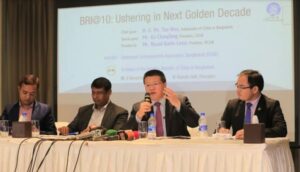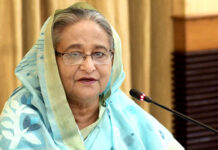 Chinese ambassador to Bangladesh Yao Wen on Thursday reiterated his country’s non-interference approach towards other countries’ internal affairs, noting that the future of Bangladesh would be determined by the people of the country.
Chinese ambassador to Bangladesh Yao Wen on Thursday reiterated his country’s non-interference approach towards other countries’ internal affairs, noting that the future of Bangladesh would be determined by the people of the country.
He laid emphasis on maintaining political and social stability through joint efforts.
‘Our policy is very clear. We don’t intervene. It is our hope that there will be stability after the next election and that our cooperation will continue,’ the Chinese ambassador said. He hoped that the election will be held based on ‘constitution and laws’.
He was addressing an event titled ‘BRI@10: Ushering in Next Golden Decade’ at a Dhaka hotel, organised by the Diplomatic Correspondents Association, Bangladesh.
CEAB president Ke Changliang spoke as the special guest at the event. DCAB president Rezaul Karim Lotus and general secretary Emrul Kayesh also spoke on the occasion.
‘We want stability. We hope, Chinese people and property will be protected. So far, we feel safe. Thanks for the efforts that have been taken,’ said the ambassador.
‘This is the pre-election year in Bangladesh. Many friends from the media have come to ask me what is China’s observations on the current political situation in Bangladesh. I want to underscore that the upcoming election is an internal affair of Bangladesh,’ said ambassador Yao.
‘The future of Bangladesh shall be determined by people of Bangladesh. China is full of confidence about the better future of Bangladesh as well as China-Bangladesh relations,’ he said.
‘As a friend of Bangladesh and a country with large investments, enterprises and personnel in Bangladesh,’ he said, ‘China sincerely hopes that all stakeholders in Bangladesh would take the fundamental interests of the people into full consideration, properly resolve their differences, and jointly maintain political and social stability.’
In two years’ time, China and Bangladesh will celebrate the 50th anniversary of diplomatic relations.
The envoy said that China was willing to take this opportunity to work with Bangladeshi friends from all walks of life to stay committed to the themes of peace, stability and development, push bilateral relations to a new level, and usher in a new era of friendly cooperation.
Responding to a question, he said that they were discussing the possibility of a free trade agreement between the two countries.
The ambassador said that they wanted more trade and investment between the two countries.
He laid emphasis on boosting Bangladesh’s exports through product diversification and having a more balanced trade in the next couple of years.
Responding to a question on political dialogue, he said that this answer should come from the political leaders, but they hoped to see political and social stability in the country.
Ambassador Yao said that the repatriation of the Rohingyas was a very complicated process that required international support.
He said that the Rohingyas were in very poor condition, and all stakeholders need to come forward to achieve the repatriation goal.
Delivering his welcome remarks, DCAB president Lotus said that the historic trip to China by Bangladesh’s founding president Sheikh Mujibur Rahman as a young politician in the mid-1950s remains forever etched in their minds. ‘And today, Bangladesh and China are moving closer together as friends on the international stage,’ he said.
New Age









